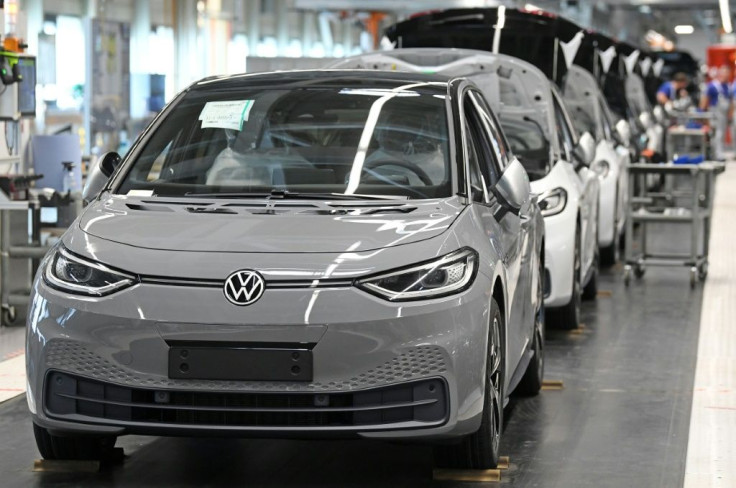'Das Auto' Goes Electric As VW Takes On Tesla
When Volkswagen chief executive Herbert Diess joined Twitter in January, he used his first tweet to warn pioneering electric car maker Elon Musk that he was coming after him.
The bold proclamation raised some eyebrows, coming from a carmaker better known for its 2015 "dieselgate" emissions cheating scandal than its green credentials.
But all that has changed since the German group announced an offensive to dominate the electric car market globally by 2025, vowing to set up six battery factories in Europe by the end of the decade.
"Volkswagen is the new Tesla," declared the Financial Times, referring to the now dominant Californian e-car group founded by billionaire maverick entrepreneur Musk in 2003.
"Our transformation will be fast, unprecedented and on a scale not seen in the automobile industry in a century," Diess said at VW's inaugural "Power Day" last Monday, where he fired off a flurry of announcements.
Industry watchers say it's a credible bet.
Bloomberg Intelligence auto analyst Tatsuo Yoshida said Volkswagen "has (the) potential to overtake Tesla's number one position... in a few years".
Karl Brauer, an analyst with CarExpert.com, said VW's "combination of financial resources and manufacturing capacity make it a prime challenger for Tesla's dominance" -- even if catching up with its US rival is "not going to be easy".
Diess, who has headed the 12-brand VW group since 2018, has never hidden his admiration for Musk, whose brash and unconventional ways have a habit of disrupting markets.
The two men have a friendly relationship and regularly exchange emails, according to an insider.
If the aim of Diess's carefully choreographed "Power Day" was to capture some of the enthusiasm of a Battery Day Tesla held late last year, particularly in the United States, it appears to have worked.
Diess's announcements saw US investors flock into Volkswagen shares, including many small traders using online platforms.
In just a week, the Wolfsburg-based car giant gained 15 percent on Frankfurt's blue-chip stock exchange, giving the group a market capitalisation of more than 130 billion euros ($155 billion).

The rise puts Diess's 200-billion-euro target within reach but he has a way to go before matching Tesla's $619 billion valuation.
VW's "forced transition" towards more environmentally friendly cars has now been "recognised by the market", said Eric Kirstetter, an auto sector expert at the Roland Berger consulting firm.
VW ironically owes its change of course to the dieselgate scandal, which forced the group into "a face-saving dive into an all-in electro-mobility strategy", said Germany-based industry analyst Matthias Schmidt.
Industry watchers note especially its decision to focus on developing a single platform for all its brands which could well be the game changer for the German giant.
The platform was used for the first time on the ID.3 model which launched late last year.
UBS analyst Patrick Hummel called it "the most significant bet on electric vehicles made by any legacy carmaker to date" as VW's competitors are using mostly mixed platforms and a combination of technologies.
VW's move is aimed at achieving economies of scale for its 12 brands.
"Tesla is learning what is takes to move into high volume, whereas companies like Volkswagen already have volumes and it's just a matter of switching volumes from one platform to another which they have done routinely in the past," said Subodh Mhaisalkar, executive director of the Energy Research Institute at Singapore's Nanyang Technological University.
But VW's size also comes with its own disadvantages -- consensus has to be found for each major decision not only with the powerful head of the workers' committee but also with managements of the group's various brands.
Beyond the core electric technology, Volkswagen is also playing catch up with Tesla on the just as important software.
Ben Kallo, an analyst at US investment bank Baird, believes Tesla will remain the market leader on electric cars because of its advances in battery cell production and autonomous driving.
"VW might not be the Apple but the Samsung of the electric vehicles world," UBS said in a report.
On Twitter, Diess is still 49 million followers short of Musk.
© Copyright AFP 2024. All rights reserved.




















